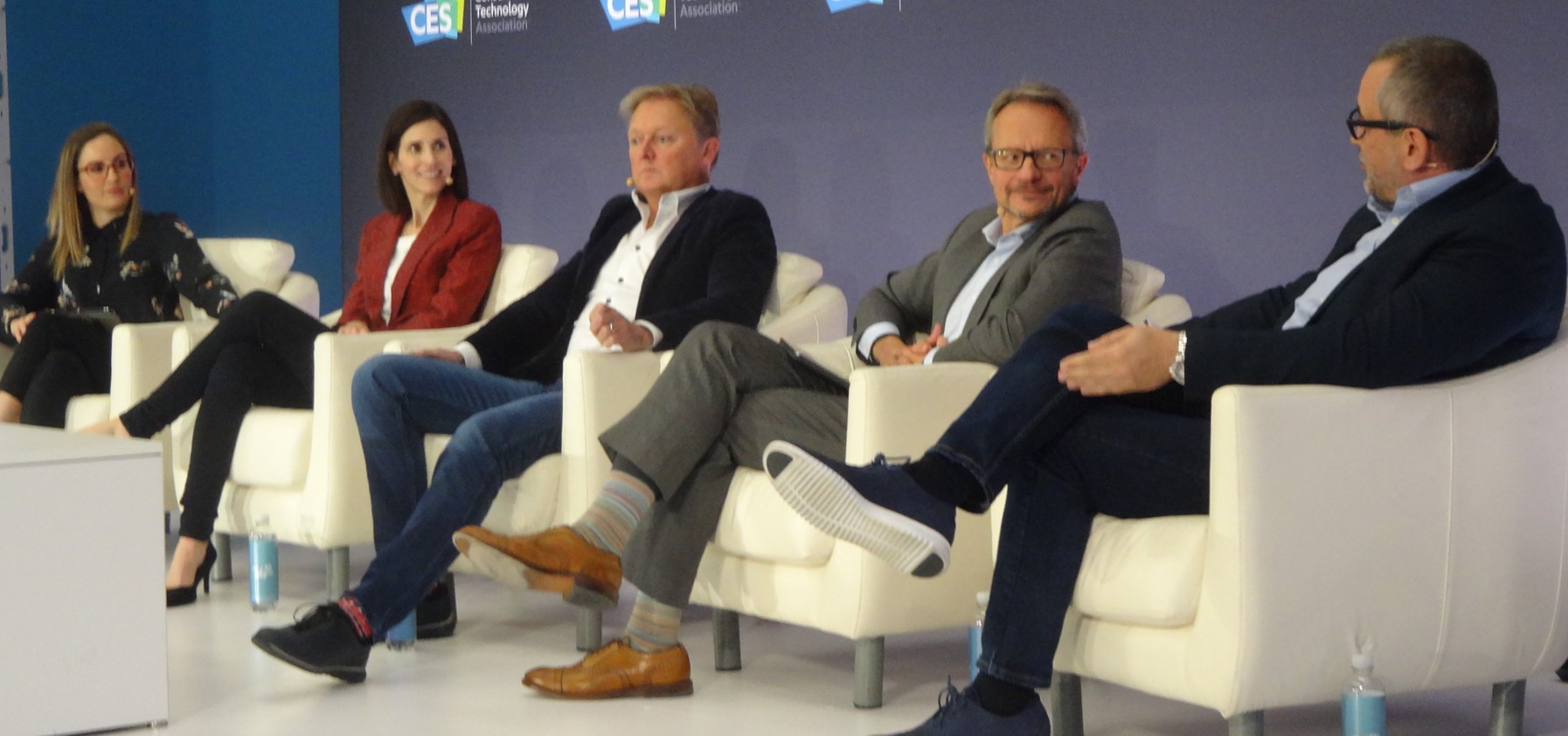Article
EVs, charging networks, on the way, experts claim
Experts claim EVs are going to expand along with EV charging stations. High costs and a lack of consumer understanding about the new technology have been slowing growth, but a 2020 International CES panel thinks change will be coming fairly soon.

January 8, 2020 by Elliot Maras — Editor, Kiosk Marketplace & Vending Times
Do electric vehicle charging stations offer a growth opportunity for kiosk manufacturers? If so, how significant of an opportunity is it, and when will it arrive?
Several reports over the past few years indicate EV charging stations are increasing as more consumers choose EVs for their environmental benefits, lower operating costs and other advantages. Yet the growth rate has been hamstrung by consumers' natural hesitancy to switch to a new form of energy.
 |
Alison Haislip, Ride by Kelley Blue Book; Lea Malloy, Cox Automotive; Henrik Fisker, Fisker Inc.; Ivo Stekac, EVgo and Olivier Bellin, Canoo, discuss EV adoption. |
An expert panel at CES this week at the Las Vegas Convention Center shared a host of reasons why EVs will become widely adopted in the not-too-distant future. And as adoption increases, charging stations will expand to serve this growth.
The discussion did not specifically address the role interactive kiosks will play in the evolution of EV charging stations. It stands to reason, however, that as the charging networks expand, network operators will require stations that include point-of-sale payment devices.
What role will kiosks play?
Kiosk manufacturers have been approached by companies interested in hosting EV charging stations in recent years.
Palmer Digital Group, for one, has been approached by content management system providers, retail chains, quick-serve restaurants, municipalities, movie theaters and casinos, said Chuck Lewis, vice president of Palmer Digital Group, a kiosk manufacturer.
Meridian, also a kiosk manufacturer, has been approached by organizations interested in installing EV charging stations, said Melissa Hayward, marketing manager.
Both Lewis and Hayward said cost has been an issue for these companies and organizations. Long-term, however, both agreed the current obstacles can and will be overcome, and both companies have developed EV charging equipment.
Both Hayward and Lewis pointed out that paid advertising on EV charging stations' digital screens could provide a way for companies to recover the cost of the chargers. Lewis added that government agencies will also be willing to support EV infrastructure under "green" initiatives.
The CES panelists agreed that changing consumers' often erroneous perceptions about EVs is one major challenge to faster adoption. The other is the need to expand charging infrastructure. These challenges are interrelated, as the lack of available charging is a main reason consumers are hesitant to buy EVs.
What's driving adoption
One reason the panelists are optimistic is that the price gap between gasoline vehicles and EVs is narrowing. Panelist Lea Malloy, associate vice president of emerging technology for Cox Automotive, which provides services for automobile dealers, noted that the price for EVs rose 2% in the last seven years versus 19% for gasoline powered cars.
Panelists Ivo Steklac, CTO and COO at EVgo, the nation's largest EV charging network, and Olivier Bellin, COO of Canoo, an EV manufacturer, agreed that EVs will achieve cost parity with electric vehicles in a few years.
Bellin said his company is making EVs available through a monthly subscription as opposed to purchasing. Fisker said his company has a flexible lease option.
Progress also is being made in the amount of time required to charge an EV and in the number of miles the vehicles can travel per charge, Steklac said. "People like to have more (miles per charge) than they really need," he said.
"(Mileage) range anxiety is something that almost all non-EV drivers have," agreed Bellin. He said consumers will be comfortable with 250 miles per charge.
In addition, Steklac said, as charging infrastructure expands, consumers will be less concerned about miles per charge.
Less maintenance is another big advantage, said panelist Malloy of Cox Automotive.
But most of all she said, "The battery electric car is a heck of a lot of fun to drive. EVs' future is bright and it's going to be exciting.
EV ecosystem players collaborate
Another reason for optimism, Steklac noted, is that players in the EV ecosystem are collaborating with each other. He said there are fewer middlemen between the factory and the consumer, compared to that for traditional vehicles, which will reduce cost.
One sign of this cooperation is the interoperability of EV charging networks. This refers to the ability to charge a vehicle at different EV charging networks. In this regard, Steklac said the U.S. is ahead of Europe, which has more charging networks than the U.S.
Three U.S. charging networks — EVgo, ChargePoint, and EV Connect — recently signed an agreement that allows drivers to use charging stations from any of the three networks with any of the three networks' apps, according to a cleantechnica.com report.
Meanwhile, Steklac said the industry is working with governments to make it easier for charging station providers to get permission to install a charging station. The industry is also working with utilities to contain charge rates, he said. Another motivating factor is expanded choice for EVs, Malloy said.
Growth expected to continue
Cumulative EV sales are set to increase to 34 million in 2025, 121.2 million in 2030, and 636.7 million by 2040 in the U.S., Europe, China and Japan, according to a Frost & Sullivan study released in November 2019.
EV charging stations are projected to post a 14.3% combined annual growth rate from 2019 to 2025, according to MarketersMedia, a research firm.
About Elliot Maras
Elliot Maras is the editor of Kiosk Marketplace and Vending Times. He brings three decades covering unattended retail and commercial foodservice.
Included In This Story
Palmer Digital Group
Palmer Digital Group specializes in indoor and outdoor digital kiosks and kiosk enclosures. Palmer Digital Group leverages 40 plus years of digital enclosure fabrication capabilities from its highly reputable parent company IEC. PDG manufactures digital kiosk solutions for virtually any industry from QSR to retail to transportation.











